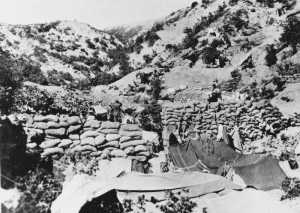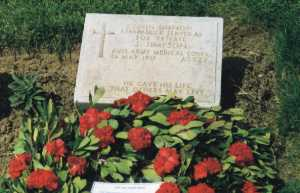At 3.30 in the morning of May 19th 42,000 Turkish soldiers launched a last, desperate, all-out attack against the 17,356-strong Anzac line, in an attempt to drive the invaders back into the sea. The Turks were caught out in the open, exposed to murderous machine-gun and artillery fire and suffered 3,000 killed and 10,000 wounded in repeated, heroic attacks over open ground which earned them the enduring admiration of their enemy. The one-sided battle lingered on until around midday. The Anzacs lost 168 men killed.
Jack had begun his day as usual, leading his donkey up to the water guard in Shrapnel Gully where he usually had his breakfast. But it wasn’t ready. “Never mind”, he said, “get me a good dinner when I come back.” He had collected a casualty and was coming back down Monash Valley, making his way between the sandbag barricades which were being built two weeks after the landing, located at intervals up the valley.

Monash Valley. Men ran between these sandbag barricades to avoid sniper fire from Dead Man’s Ridge, which can be seen on the skyline at the head of the valley. (Deans Collection, QE II Waiouru).
As he approached the spot where Major General Bridges, the Australian Divisional commander, had been shot four days earlier, a signaller (D.M. Benson, dug in along Monash Valley together with six fellow members of his unit) called out to him, warning him of the Turkish machine-gunner who was sweeping this part of the gully. Jack waved back in acknowledgment.
The machine-gun bullet hit him in the back, carrying him forward. He ended up face down in the dirt.
Jack had only just passed Maurice Mahney and Teddy Langoulant going up the valley in the opposite direction. After exchanging a few words Jack had made a joking remark to his Irish mate, in his “put-on” Irish accent, then they’d passed on. When they heard someone shouting that Simpson had been shot, Mahney and Langoulant came running back and found their mate, with his donkey standing next to him. Then Andy Davidson and John Prately came on to the scene. “A machine-gun bullet had entered his back and passed out the front of the stomach having penetrated a vital organ,” Andy later recorded. “We laid him down carefully - and put his body in a dugout by the side of the track, and carried on with our job. There was great gloom on Anzac that night when it became known that Simpson had died. We finished our duty at 7 pm, and all that was left of our section gathered around our old pal and carried him down to Hell Spit, where we buried him. A clergyman officiated.” A simple wooden cross marked his grave, on which was written only his name:
Jack Simpson
After the Armistice Jack was given a headstone in the Beach Cemetery at ANZAC Cove. The fate of Jack’s last passenger must remain uncertain, because of conflicting accounts (Andy and Bert made no mention of him): some claiming he was killed; others, that like the donkey he was unharmed by the burst of machine-gun fire which claimed Jack. The commanding officer of the 21st Kohat Indian Mountain Battery, Lt-Col. A.C. Fergusson DSO, explained what became of Jack’s last donkey: “(Simpson) had many donkeys and men killed beside him but led a charmed life till 19th May. We treasured his last donkey and evacuated it safely at the end with a view to presenting it to Australia but it was stolen from our mule lines in Mudros.”
Jack’s mother Sarah was beside herself with worry (as was Annie), which she couldn’t keep out of her letters. On May 20th she’d concluded a letter with:
Now my dear son write and let me know how you are keeping for mind my lad that this is a terrible anxious time for me. I am anxiously following the war in the Dardanelles. I am thirsting for every detail of news that I can get for I still get my papers night and morning and I couldn’t live without them. Now my dearest son hoping and trusting that the Lord in his great mercy will guard and protect you in these terrible times and that he will hear my prayers for you from your ever loving and affectionate Mother.
Annie added a PS to a letter she wrote on May 24th: “I won’t worry you to write to me for I know when you are off duty you will need all the rest you can get. So long as Mother gets a few lines. Oh Jack it would make your heart ache to see her waiting and watching for the post.”
In a later letter Sarah couldn’t restrain her anxiety, “Now my dearest lad”, she wrote, “I wonder if this war will keep me from seeing you again. I hope not. Now my dear son I will have to stop for I am broken hearted. I am worried to death and I can’t help it. Goodnight and God bless you and take care of yourself and write soon for I feel crazy.”
Annie’s last letter was returned to her by the Army Authorities, unopened, with the single word “Killed” written across the front of the envelope. Capt. Fry, the adjutant, wrote a very kindly letter to her on September 2nd (Sutton had left the unit by then and Major Butler had been wounded), explaining what Jack had done and how he was admired by all the men of his unit.
“Everyone from the general downwards seems to have known him and his donkey”, Fry wrote. “The valley at that time was very dangerous as it was exposed to snipers and was also continuously shelled. He scorned the danger, and always kept going whistling and singing, a universal favourite.”
Fry concluded: “I wish to express the deep sympathy of our whole unit with Mrs Simpson and yourself in your sad bereavement.”
Jack was recommended for the Victoria Cross, officially, through his unit, on June 3rd 1915. He was also recommended for the highest military honours by Colonel (later General Sir John) Monash, Australia’s greatest commander of the First World War. Monash, commander of the 4th Brigade at the time (where Jack was operating) an eye-witness to his activities sent in a lengthy submission to Divisional Headquarters on May 20th, the day after Jack had been killed. This reads in part:
Private Simpson and his little beast earned the admiration of everyone at the upper end of the valley. They worked all day and night throughout the whole period since the landing, and the help rendered to the wounded was invaluable. Simpson knew no fear and moved unconcernedly amid shrapnel and rifle fire, steadily carrying out his self-imposed task day by day, and he frequently earned the applause of the personnel for his many fearless rescues of wounded men from areas subject to rifle and shrapnel fire.
After Simpson’s death Lt-Col. Sutton wrote in his diary: “May 24 - I sent in a report about No. 202 Pte. Simpson J., of C Section, shot on duty May 19th. He was a splendid fellow and went up the gullies day and night bringing down the wounded on donkeys. I hope he will be awarded the D.C.M.” On June 1st Sutton wrote: “I think we will get a V.C. for poor Simpson.” Then on June 4th he wrote: “I have been writing up poor Simpson’s case with a view to getting some honour for him. It is difficult to get evidence of any one act to justify the V.C. the fact is he did so many.”
Unfortunately, the senior medical officer at Anzac, Colonel Howse VC, had given faulty instructions to the junior officer preparing Simpson’s citation.
Jack was recommended under the wrong category of heroism and consequently his VC request was denied.
In July 1967 Australian leaders tried to correct this tragic error by sending a petition to the British War Office, signed by the Prime Minister, the Governor General, the Chief of the General Staff, and other leaders on behalf of the Australian people, requesting that a posthumous Victoria Cross be awarded to Private John Simpson Kirkpartrick. The request was denied, on the grounds that it would be setting a dangerous precedent. This also was incorrect. The precedent had already been set. In 1907 two British officers, Lieutenants Melvill and Coghill were posthumously awarded the Victoria Cross for their actions in South Africa, twenty-eight years previously.

Simpson’s headstone at the Beach Cemetery, ANZAC Cove.
‘ ... Despite his rough and often larrikin behaviour Simpson was genuinely concerned for the welfare of other people - and not only that of his family and friends, but of total strangers - to the point that he was willing to jeopardise his life to help them. He was not only a hero, he was a human being.’
LEST WE FORGET





